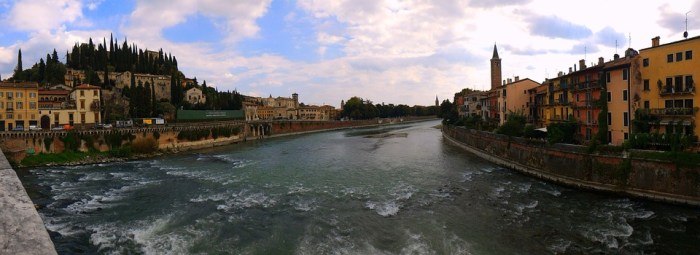
The humanist and historian Biondo Flavio (1392–1463) conducted a historical survey of all of Italy, going through the country region by region. The result of his labors was the massive Italia Illustrata, probably the first topographical survey since ancient times. We have recorded elsewhere his description of bird-hunting in Anzio. We will now linger over his description of the rich agricultural regions near Verona and the River Adige.
The reader will recall that Verona is located in the Veneto region of north Italy. Writing around 1474, Flavio had this to say about the area:
But the Adige not only divides Verona, it also encircles it, serving at the same time as a defense and an amenity. It is also very useful to the Veronese for transport up and down the river of goods and crops, the land all around being of exceptional quality and productive of much agricultural produce for the supply of the city: great quantities of oil, copious grain for the inhabitants to trade, a variety of good quality wines, fruit of all sorts in abundance, and wool of a delicacy superior to the rest of Italy’s so that there is no region of Italy that does not get a portion of its clothing from Verona. The territory of Verona provides [olive] oil as well, in particular the part bordering on the right shore of Lake Garda, which is covered by plantations of olive trees like a great forest, and vast fields of seedlings stretching as far as the eye can see bring forth grain. [Translation by J.A. White]
Flavio then praises the excellence of the local wines, in particular one called the Accinaticum:
Many considerations attest to the excellence of Veronese wines, but this is the strongest argument, that Theodatus, third king of the Ostrogoths, had a wine of the sweetest bouquet and savor that he knew in Veronese territory, the “Accinaticum” of Cassiodorus [a type of wine?] shipped to Rome by way of the Adige down into the Adriatic. I may quote Cassiodorus’s actual words here: “The wine is of a royal purple color with an outstanding bouquet and an incomparable sweetness of taste, though on the palate it has such a rich body that you might think it liquid meat or an edible drink.”

I have tried to find out more about this wine he calls “Accinaticum,” but have not been able to unearth any further information about it. Flavio then returns to a description of the richness of the soil in the area, which is so abundant that it attracts “herbalists” (called in Latin herbilegi):
Several other Italian cities can match Verona for abundance of fruit, but nowhere else has such sweet-smelling fruit and of so many different kinds. Some of them have a marvelous longevity, since as they age they stay so firm and unbruised that they can be eaten together with fresh fruit at its peak. Flocks of sheep derive the excellence of their wool from the special quality of the grass and fodder, which the meadows and the equally delightful fields provide by nature’s bounty, thought the lofty mountain called Monte Baldo that towers above the city has grass of equal quality and even more energy.
On that account herbalists flood in here from far and wide to pick the many kinds of grasses and roots that promote good health in animals. The countryside and towns of the Veronese teem with waters of many different kinds, a gift of nature both practical and attractive, bearing in mind its usefulness for irrigation, for trades of all sorts, or simply for drinking water.

There must be some special mineral quality to the soil in this region that gives the plants their vitality and robustness. Flavio goes on to describe the area’s magically restorative waters, which (he assures us) can perform wonders when sprinkled over a woman’s breasts:
One of these in particular I cannot pass over in silence: in the Valpolicella (so-called for the quality of its soil and the excellence of its produce), in a spot called Negarine, breasts like those of women have formed from the rock, and from the nipples drops of water continually drip: if a lactating woman’s milk has dried up owing to some illness or other misfortune, as happens, it will be restored when she sprinkles the drops over her breasts.
Here again I have been unable to find out anything more about this spot Flavio calls the “Negarine.” From his description, it appears to be some kind of rock formation or natural spring. We may doubt the specific curative powers he ascribes to its waters, but it is an evocative image nonetheless. One wonders whether Flavio was passing on local legend, or describing some personal experience. The reader will have to judge for himself. As always, Italy remains excellent in all things.

You must be logged in to post a comment.